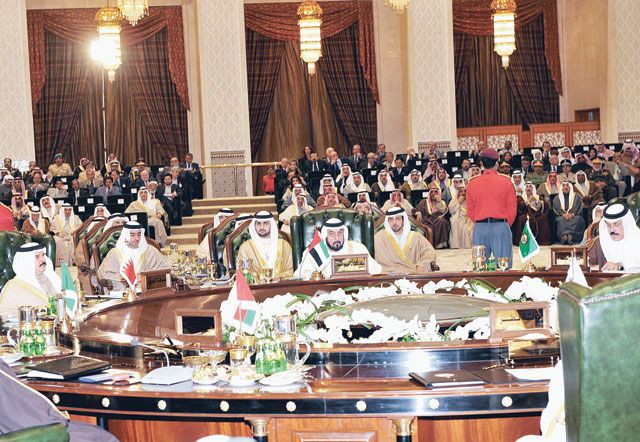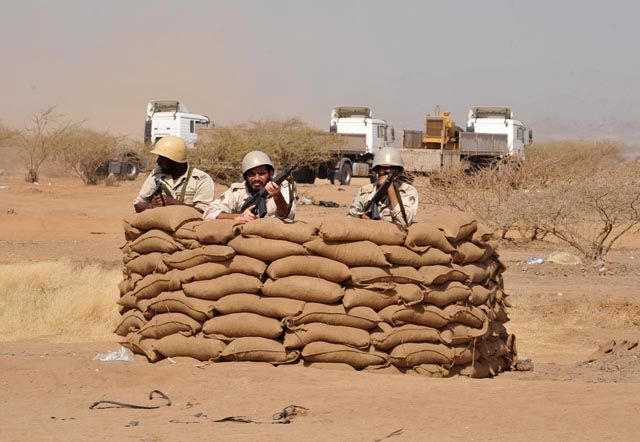Manama: Gulf leaders on Wednesday supported Saudi Arabia in its fight against Yemen's Al Houthi rebels and also called on Tehran to respond to the GCC's repeated calls to solve diplomatically the issue of the three UAE islands occupied by Iran.
The heads of state said that they would endorse Bahrain's candidature as for secretary general, who will take office in 2011 in place of Abdul Rahman Al Attiyah of Qatar who has been in office since 2002.
"I pity the man who will come after you because he will have a formidable task replacing you. The last few years have been truly exceptional in the progress of the GCC," Kuwait's Deputy Prime Minister and Foreign Minister Shaikh Mohammad Sabah Al Salem Al Sabah told Al Attiyah at the customary joint press conference.
The communiqué said that the Supreme Council welcomed the ratification of the Monetary Union by Bahrain, Kuwait, Qatar and Saudi Arabia. Oman in 2006 opted out of the union while the UAE this year withdrew after it contested the choice of Riyadh as the base for the proposed Gulf central bank. The union is expected to pave the way for a single currency.
The leaders called for the formation of a Monetary Council board of directors that will set a time line to issue the single currency. The board will include central bank governors from Kuwait, Saudi Arabia, Bahrain and Qatar.
The leaders expressed confidence over the ability of their economies to overcome the impact of the global economic crisis.
"The summit welcomes efforts taken by the member states to contain the impacts of the global economic crisis and expresses confidence in the strength of the Gulf economies and their capabilities to overcome the impacts of the crisis," the communiqué said.
The heads of state requested the GCC economic and financial cooperation committee to look into a Qatari proposal to establish a development bank for the GCC states.
Train service
The GCC recommended the completion of studies to determine the cost of electricity-powered passenger trains at speeds of 350 km/h and to assess the possibility of harmonising them with cargo trains at speeds of up to 200 km/h using diesel in line with the best specifications for the railway sector.
On the joint GCC common market issue, the final communiqué expressed satisfaction with the accomplishments and endorsed equality in treatment among the GCC states in the field of technical education.
Speaking at a joint press conference with Shaikh Mohammad, Al Attiyah said the six states have agreed to create a joint security force for quick intervention to address security threats.
The force would intervene in situations similar to an incursion into Saudi Arabia by the Yemeni Al Houthi rebels earlier this year.
The summit communiqué said the leaders "affirm total backing for Saudi Arabia in facing the aggressions by armed infiltrators, express total solidarity with Saudi Arabia and support its right to defend its territories".
The communiqué also reiterated the UAE's sovereignty over the islands of Abu Mousa, and Greater and Lesser Tunbs occupied by Iran, their regional waters, air space, continental shelves, and the economic zone as an inseparable part of the UAE. "The leaders expressed their regret that contacts with Iran had not made positive results that would lead to resolving the issue of the three islands, thus boosting the security and stability of the region. They called for looking into all peaceful measures aimed at reinstating the UAE's sovereignty over the three islands, and also called on Iran to respond to the UAE's efforts in this regard out of commitment to good neighbourly relations," it said.
The summit has also urged a peaceful resolution of Iran's current standoff with the West over Tehran's controversial nuclear programme. It stressed the need to rid the Middle East of weapons of mass destruction (WMD) and nuclear arms.
Shaikh Mohammad, at the press conference, said that the GCC rejected military action against Iran, explaining that "any military tension in the region would have negative repercussions on all the GCC states".
The Kuwaiti leader rejected media speculation that the summit ended three hours later than initially announced as a sign of disagreement among the GCC states.
"The fact that the last session ended late was because it started three hours late. It was supposed to start at 9am, but eventually began at noon. The heads of state preferred to use the morning to exchange visits," he said.














